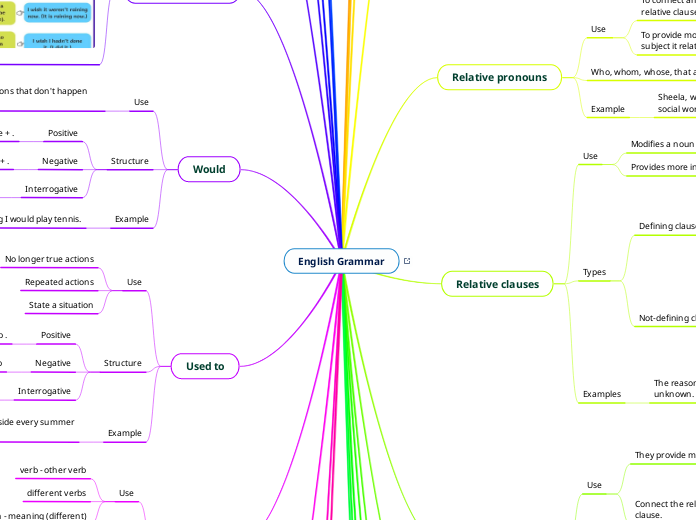a Martina Verdezoto 2 éve
272
English Grammar

a Martina Verdezoto 2 éve
272

Még több ilyen
All
Nobody
Everyone
Which
What
Who
Themselves
Herself
Myself
Those
That
This
Their
Her
His
They
She
He
There are already several people waiting for a table at this restaurant.
What height is the Empire State Building?
Each employee was given a raise
Cardinal numbers|I’m close with my four siblings.
Other shoes might match your outfit better.
Penelope brought her cat to the vet.
I don’t want to sit at this table. I want that table near the window.
The moon looks beautiful tonight.
Did/Didn’t + use to + m. verb
S + didn’t/did not + use to + m. verb
S + used to + inf. verb .
Would + S + main verb base + ?
S+ would not/ wouldn’t + main verb base + .
S + would + main verb base + .
Had + S + been + v-ing + ?
S + had + been + v-ing + .
Had he studied for the test?
They hadn't finished their homework
The film had started before we arrived.
Had + S + verb (past participle) + complement?
S + had + not + verb (past participle) +complement
S + had + verb (past participle) +complement
Was/were + S + verb (ing) + object?
S + was/were + verb (ing) + object
Did not + subject + infinitive
Subject + did not + infinitive
Did + subject+ infinitive
Subject + verb + ed
Depends on the subject of the sentence. For singular subjects (he, she, it), "was" is used. For plural subjects (we, you, they), "were" is used
Was/Were + subject + past participle verb
Subject + wasn't/were n't+ past participle verb
Subject + was/were + past participle verb
Is this painting drawn by you?
A lot of cod is caught in the North Atlantic.
The car isn't washed every week.
When we want to emphasize the action (the verb) and the object of a sentence rather than the subject.
Am/is/are + subject + past participle verb
Subject + am not/isn't/aren't + verb in past participle
Subject + am /ist/are + verb in past participle
The book on the table
An apple
A car
To specify a particular noun.
Before nouns that begin with a vowel sound.
Before nouns that begin with a consonant sound.
Won’t + Subject + Base form of the verb
Will + Subject + Base form of the verb.
Subject + Will not/Won’t + Base form of the verb.
Subject + Will + Base form of the verb.
By the end of the year, she will have been working on the publication for over ten years.
We’ll be coming next weekend.
He will be 50 next month.
She'll write the e-mail after lunch
To talk the duration of a situation until a certain time un the future
To talk about situations or actions that will be in progress at a certain time in the future
For things we thing or believe will happen in the future
For action that will happen/be completed by a certain time in the future
Refers to a place, information about location
The house where I grew up is now a museum.
I understand the reason why she was upset.
Refers to a time
The day when we met was unforgettable.
Reason
Place
Time
Never use THAT
We always use a relative pronoun
We use commas around them
Extra information
If there’s a subject after the pronoun, we can eliminate the pronoun
We do NOT use commas around them
Essential information
Had better
Had better not
Oght to
Should
Shouldn't
Had to
Have got
Have
Must
Must
Had better
Will
Shall
Can
Could
Probable
Possible
Permissible
Advisable
Necessary
Does Jack play football?
She does not play with a ball.
She plays with a ball.
Do/does + he/she/it/I/we/you/they + verb + ?
do/does + not + infinitive of the verb
3rd person singular (he, she, it) infinitive + -s
Are you dancing?
She is not (isn't) talking
She is talking.
Am/is/are subject + verb (ing) + pbject + ?
Subject + to be + not + base + ing
Subject + to be + base + ing
Have you had fun today?
She has not watched 'Titanic' yet.
I have bought a ticket for every game this season
Have/has + subject + v3 + object +?
Subject + have/has + not + v3 + object
Subject + have/has + v3 + object